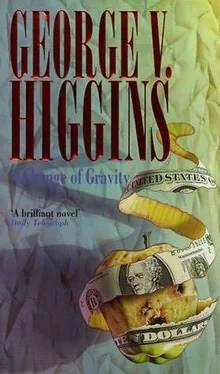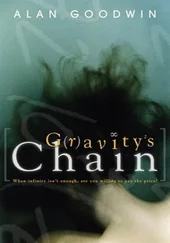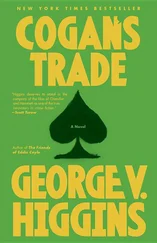George Higgins - A change of gravity
Здесь есть возможность читать онлайн «George Higgins - A change of gravity» весь текст электронной книги совершенно бесплатно (целиком полную версию без сокращений). В некоторых случаях можно слушать аудио, скачать через торрент в формате fb2 и присутствует краткое содержание. Жанр: Криминальный детектив, на английском языке. Описание произведения, (предисловие) а так же отзывы посетителей доступны на портале библиотеки ЛибКат.
- Название:A change of gravity
- Автор:
- Жанр:
- Год:неизвестен
- ISBN:нет данных
- Рейтинг книги:5 / 5. Голосов: 1
-
Избранное:Добавить в избранное
- Отзывы:
-
Ваша оценка:
- 100
- 1
- 2
- 3
- 4
- 5
A change of gravity: краткое содержание, описание и аннотация
Предлагаем к чтению аннотацию, описание, краткое содержание или предисловие (зависит от того, что написал сам автор книги «A change of gravity»). Если вы не нашли необходимую информацию о книге — напишите в комментариях, мы постараемся отыскать её.
A change of gravity — читать онлайн бесплатно полную книгу (весь текст) целиком
Ниже представлен текст книги, разбитый по страницам. Система сохранения места последней прочитанной страницы, позволяет с удобством читать онлайн бесплатно книгу «A change of gravity», без необходимости каждый раз заново искать на чём Вы остановились. Поставьте закладку, и сможете в любой момент перейти на страницу, на которой закончили чтение.
Интервал:
Закладка:
From the beginning Lane was publicly forthright about the civil powers he'd annexed as well the power to dispose of minor criminal matters; experience on the civil side revealed to the legally savvy the meritorious economies of time and expense of the Lane approach and led to its adaptation for quick and quiet resolution of minor criminal matters especially motor vehicle violations, but no one involved saw any need to publicize that. "Phone bills; oil bills; light bills; gas bills: most people've got no idea what a mountain of chickenshit we get every day in this building," Larry said. "Until he took the judgeship, Chassy was one of them."
Spring as a somewhat-affected teenager had formed the lifetime habit of abbreviating his given name as "Chas.," when he signed it in black ink with a gold-nib bed Waterman fountain pen, copying the steel-point signature reproduced as attestation of ironclad security on the cover of every policy issued by the company his namesake grandfather had founded in 1884, Pioneer Valley Insurance. His seventh-grade teacher, amused by the mannerism, had taken it at face-value, applying the durable nickname.
"Chassy'd always been a rich kid; what'd he know? Bills came into his house and went out the next day, paid. His daddy never had to go to court and have a judge yell at him, tell he'd better pay Ralph at the Gulf station down in Ingleside for the rebuilt engine in his car; fifteen bucks out of his paycheck every week until he paid the whole three hundred. Tell him if he didn't do it, Ralph was gonna get the car. If the engine in Chassy's father's car started burning oil, Chassy's daddy knew what to do. Nothing to it: he went down to DeSaulnier Chrysler-Plymouth, picked out a nice new Imperial hardtop and wrote out a company check. When Chassy finished law school and came home to practice law, he didn't have to run himself ragged, finding a job, get himself all tuckered out. He went to work where Dad worked, in the general counsel's office of the insurance company Dad'd inherited from Granddad.
"So, when Chassy became a district court judge he was shocked by what he discovered. Up 'til then he'd thought a civil matter was something that you did in superior or federal court. You hated to, but you had no choice. Major borrower'd begun defaulting on six-figure construction-bond payments. You had to protect your investors. It wasn't something that happened to you, because you'd gotten more than two months in arrears on your TV installment payments. "And anyway, what the hell are these things, these "installment payments"? Don't people have to pay for what they get in your store before you let 'em take it home?"
"Chassy just had no idea how many people there were who didn't pay their bills for the plain and simple reason that they couldn't. They didn't make enough money to buy all the things they thought they really oughta have, but they'd gone out and bought them anyway. The first month or so we're in business here he thought the reason that we had such a volume of Small Claims business was that Arthur and Roy Carnes'd been telling the truth when they talked their buddies in the legislature into setting up this court for their very own. It was true: the four towns had really needed it. But since he thought it was all backlog, pent-up demand, he assumed in time wed clear it up. Then when we didn't, because it wasn't, he didn't know which way was up.
"Instead of getting less, we got more. Once the plaintiffs and their lawyers finally found out we were here. It was like the tide coming in. Chassy finally realized something new hadda be done.
"It isn't easy to do something new in any courthouse, this one especially. A lot of the people in here: once they got to know Chassy a little, they decided they probably were never going to like him.
There were days when I was one of 'em. He could be a fussy bastard, really get on your nerves. And he treated Lennie Judge Cavanaugh, when he first came aboard, awful young but still and all, he was another judge like he was shit. Naturally Lennie didn't like him very much, and he had company. That was why when Chassy wanted to get something done in his courthouse, it could take a pretty long time. Even when everybody else could see it was a good idea, as his ideas generally were, they were in no hurry to see it get done.
"So we had to fix the problem with Small Claims by ourselves no help from anyone else. We decided that in the afternoons I'd become a junior judge. I'd hear all the petty civil cases. That'd free up about three or four hours every day for Chassy after lunch to do what he really liked to do, and was good at doing, too: watching the stock-ticker, following the market, picking out what stocks he thought we should be investing in with all this money we now had. Which me and Fiddle and Roy naturally wanted him to be doing with his time, just as much as he did. Much better having him out there making us richer'n to have him sittin' on his ass here in the court all afternoon, hollering at a buncha poor dead-beats whose chief money problem was they didn't make enough to pay their bills.
"So what we would do was have the normal sessions in the morning, until noon or as long's it took. Then unless we had a criminal matter go to trial, the afternoon and we all tried very hard around here to make sure we wouldn't; we had those police prosecutors and the defense lawyers beltin' out plea-bargains left and right as soon as we broke for lunch Chassy'd grab his coat-n'-hat and run out the door, jump in his Chrysler and high-tail it down to the brokers in Springfield. The rest of the day that's where he'd be, happy as a pig in shit at Tucker, Anthony and R. L. Day, down there on State Street; in his element. It was home to him there; he belonged. His daddy'd started taking him there when he was a little boy. And because he was happy, and also outta here, everybody in the courthouse who didn't like him was happy too. Me especially, of course, because he was making me money."
"When Chassy called the Canterbury District Court "my court," he meant it," Lane told Merrion. "He acted like he owned the place and could do anything he liked. When people said he was arrogant, they were right.
Whether he did it on purpose, to piss people off, or he never realized how people took it; that I really never knew. I didn't really mind it, myself. He was a smart son of a bitch and he treated me all right. He helped me make money. Naturally I'd think he was a pretty okay-type of guy.
"And anyway, the fact of the matter was that when he said "This is my courthouse," he had it about right." Spring had grown up in Holyoke.
He had gone to Deerfield Academy and then to Harvard ('46) and Harvard Law School ('49) with Roy Carnes. Carnes in 1952 had won the first of the five terms he would serve in the state House of Representatives, representing the easterly part of Holyoke along with the towns of Canterbury, Hampton Pond, Hampton Falls and Cumberland. In 1960, Holyoke voters approved his all-but-hereditary succession to the state Senate seat held by his uncle, Arthur, forced by failing health to retire.
Virtually by acclamation, Arthur had won what became known as 'the Carnes senate seat' when the death of the incumbent opened it in 1946.
That had been less than a year after he was invalided home from World War II army service in Europe. He had lost his left arm during the drive for the Rhine. When he died in May of 1966, a fellow WW II veteran and friend of many years, Holyoke Transcript Telegram city editor and weekly columnist Reg Gault collected and published a full page of tributes to him, ending with his own: "Arthur was entitled to wear the Distinguished Service Cross, the Silver Star, two Bronze Stars, and three Purple Hearts. He seldom did.
"He figured in many eyewitness stories of combat heroism. I didn't hear them from him; I heard them from other soldiers, who had fought alongside him. Arthur was born in this city in 1913. He went away to school, and then he spent those war years in Europe. He took his legislative work seriously, as he took everything except himself, and so until his health forced his retirement, he kept an apartment in Boston, where he spent much of his time. "Far too much of it," he would tell you, voicing just about the only complaint I ever heard him utter, "too far from my home, from my friends, and much too far from Grey Hills," the club he'd been instrumental in creating on the abandoned estate of Jesse Grey, and the golf game he'd astonishingly somehow learned to play again with one arm "not quite as well, though," he would say after his war wound.
Читать дальшеИнтервал:
Закладка:
Похожие книги на «A change of gravity»
Представляем Вашему вниманию похожие книги на «A change of gravity» списком для выбора. Мы отобрали схожую по названию и смыслу литературу в надежде предоставить читателям больше вариантов отыскать новые, интересные, ещё непрочитанные произведения.
Обсуждение, отзывы о книге «A change of gravity» и просто собственные мнения читателей. Оставьте ваши комментарии, напишите, что Вы думаете о произведении, его смысле или главных героях. Укажите что конкретно понравилось, а что нет, и почему Вы так считаете.











